How to Reduce Plastic Waste
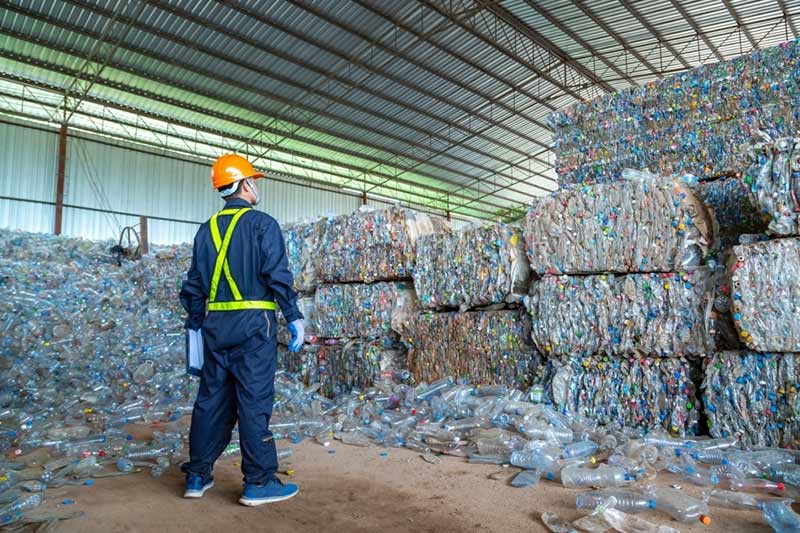
The global plastic waste problem is rapidly becoming one of the most pressing environmental challenges of our time. Every year, millions of tonnes of plastic waste are generated, much of which ends up in landfills, oceans, and other ecosystems, wreaking havoc on both the environment and wildlife. As individuals, it's crucial that we take action to reduce plastic waste and minimise our impact on the planet.
In this blog, we'll delve into the issues surrounding plastic pollution, explore its consequences, and provide practical strategies for reducing your plastic footprint.
By understanding the harmful effects of plastic and implementing the strategies outlined, we can all contribute to a greener, more sustainable future. Let's take the first step together and embark on our journey towards reducing plastic waste.
Types of Plastics and Their Impact
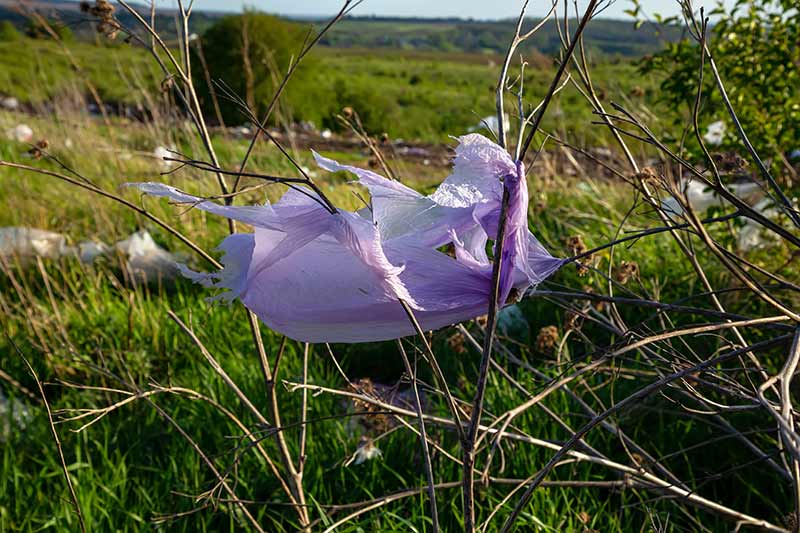
Common Types of Plastics
Plastics come in many forms, and understanding the different types can help us make better choices when it comes to consumption and disposal. Some common types of plastics include:
- PET (Polyethylene Terephthalate): Commonly used in drink bottles, food containers, and packaging materials
- HDPE (High-Density Polyethylene): Often found in milk jugs, detergent bottles, and shopping bags
- PVC (Polyvinyl Chloride): Widely used in pipes, electrical cables, and some toys
- LDPE (Low-Density Polyethylene): Typically used for plastic bags, cling film, and squeezable bottles
- PP (Polypropylene): Found in bottle caps, straws, and food storage containers
- PS (Polystyrene): Commonly used for takeaway food containers, disposable cutlery, and packing peanuts
Biodegradable and Non-biodegradable Plastics
Not all plastics are created equal. Some are biodegradable, meaning they can break down naturally over time, while others are non-biodegradable and can persist in the environment for hundreds of years. It's essential to be aware of the differences and choose biodegradable options whenever possible.
Impact of Plastic on the Environment and Wildlife
Plastic pollution has far-reaching consequences for both the environment and wildlife. As plastic waste accumulates in landfills and oceans, it can release harmful chemicals into the soil, water, and air. This can contribute to a range of environmental problems, including climate change, soil degradation, and water pollution.
Moreover, plastic waste poses a significant threat to wildlife. Many animals, including birds, fish, and marine mammals, can mistake plastic debris for food, leading to injury or death. Plastic waste can also entangle animals, causing severe injuries and restricting their movement.
UK Plastic Waste and Carbon Emission Statistics
The United Kingdom is facing significant challenges when it comes to plastic waste and carbon emissions. Here, we'll provide an overview of some key statistics to help illustrate the scale of these issues in the UK.
- Annual plastic waste generation: The UK generates around 5 million tonnes of plastic waste each year, making it one of the largest producers of plastic waste in Europe
- Plastic waste from UK households: The average UK household produces 66 items of plastic waste a week, making the UK total, 96.6 billion pieces of plastic wasted each year
- Single-use plastic waste: In 2019, an estimated 3 million metric tonnes of plastic waste were disposed of in the UK, making it the fifth-largest producer of plastic waste globally
- Global greenhouse gas emissions: In 2019, the carbon footprint of plastic throughout its entire lifecycle was 4% of all global greenhouse gas emissions
In a bid to combat plastic pollution and reduce greenhouse gas emissions, the UK government is introducing a ban on single-use plastic items such as plates, trays, bowls, cutlery, balloon sticks, and certain polystyrene cups and food containers from October 2023. This ban will impact retailers, takeaways, food vendors, and the hospitality industry.
- Public support for the ban: Over 95% of respondents to a government consultation were in favour of the ban
- Litter reduction: Plastic cutlery was among the top 15 most littered items in England in 2020; the ban is expected to significantly decrease plastic waste and littering
- Previous ban successes: Following the ban on straws, stirrers, and cotton buds, cotton bud sticks were no longer among the UK's top ten most common beach litter items
The government is also considering further measures to address other problematic plastic items such as wet wipes, tobacco filters, and sachets, potentially including bans and mandatory labelling on packaging. A new research project will investigate the impact of wet wipes on sewage system blockages to inform future policy actions.
The 6 Rs of Plastic Pollution
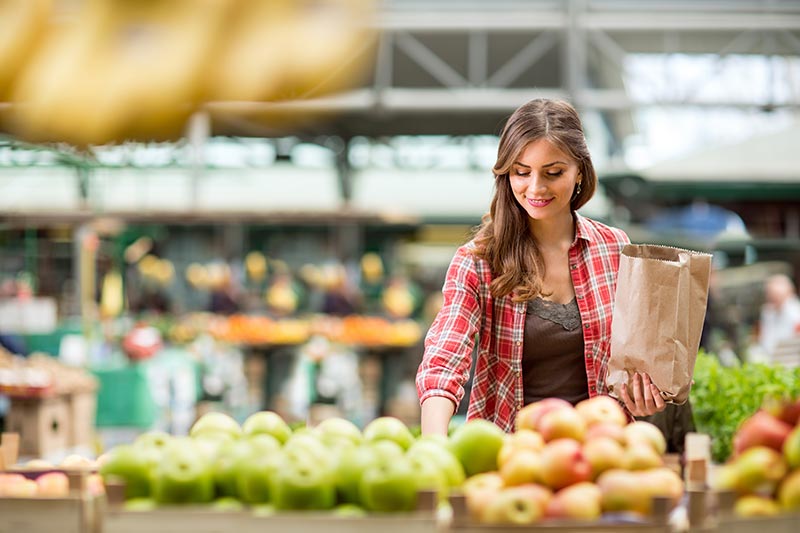
Effectively combating plastic pollution requires a change in our habits and a commitment to the 6 Rs. By understanding and incorporating these principles into our daily lives, we can make a meaningful impact on reducing plastic waste.
Refuse - The first step in reducing plastic waste is to refuse single-use plastics whenever possible. This means turning down plastic bags at the supermarket, saying no to plastic cutlery between now and October 2023, and avoiding products with excessive plastic packaging. By actively refusing single-use plastics, we send a clear message to manufacturers and retailers that we demand more sustainable alternatives.
Reduce - To further minimise plastic waste, make a conscious effort to reduce your overall plastic consumption. This may involve purchasing products with minimal packaging, buying in bulk, or opting for items made from more sustainable materials. By reducing the amount of plastic we bring into our lives, we can significantly decrease the amount of waste that ends up in landfills and oceans.
Reuse - One of the most effective ways to tackle plastic pollution is to reuse items as much as possible. Invest in reusable water bottles, coffee cups, shopping bags, and food storage containers to replace their disposable counterparts. Not only will this help to cut down on plastic waste, but it can also save you money in the long run.
Repurpose - Get creative and find new uses for old or unwanted plastic items. For instance, you can repurpose empty plastic containers as planters or transform plastic bottles into bird feeders by cutting openings for birds to access seeds. By repurposing items, we can extend their lifespan and reduce the demand for new plastic products.
Recycle - Proper recycling is crucial for managing plastic waste. Familiarise yourself with local recycling guidelines and facilities to ensure that you're disposing of plastic items correctly. Some hard-to-recycle plastics, such as plastic film and certain packaging materials, may require special recycling programmes or drop-off locations. By recycling as much plastic waste as possible, we can help to reduce the amount of new plastic that needs to be produced.
Rethink - Lastly, take a step back and rethink your habits, routines, and consumption patterns. Reflect on areas where you can make improvements and set achievable goals for reducing your plastic footprint. As you learn and grow, continue to educate yourself and others on the importance of tackling plastic pollution.
By embracing the 6 Rs and adopting a mindful consumer mindset, we can work together to create a more sustainable future and reduce the negative impact of plastic waste on our planet.
Mindful Shopping: Eco-Friendly Choices for Reducing Plastic Waste
When it comes to reducing plastic waste, adopting a mindful consumer mindset is crucial. By considering the environmental impact of our choices, we can make more sustainable decisions and decrease our plastic footprint.
Evaluate Your Personal Plastic Consumption
Start by taking a closer look at your current plastic consumption habits. Assess the types and amounts of plastic you use daily, weekly, or monthly, and identify areas where you can make improvements. This self-awareness will enable you to make more informed choices and prioritise your efforts to reduce plastic waste.
Make Conscious Purchasing Decisions
When shopping, keep the following tips in mind to reduce your plastic consumption:
- Buy canned drinks and food items instead of plastic when possible. Cans are often more easily recyclable than plastic, and many food and drink items are available in this format
- Choose eco-friendly packaging at farmers' markets, green grocers, bakeries, and butchers. Shopping at local businesses that prioritise sustainability is a great way to support your community while reducing your plastic footprint
- Look for products made from recycled or biodegradable materials. By choosing items made from more sustainable materials, you can help to drive demand for eco-friendly products and encourage manufacturers to adopt greener practices
Support Businesses with Eco-Friendly Practices
Vote with your wallet and choose to support businesses that are committed to reducing plastic waste and embracing sustainable practices. This might include zero-waste shops, local farmers' markets, or companies that use minimal or plastic-free packaging. By supporting these businesses, you can help to create a more sustainable marketplace and inspire other companies to follow suit.
Replacing Single-Use Plastics with Reusable Alternatives
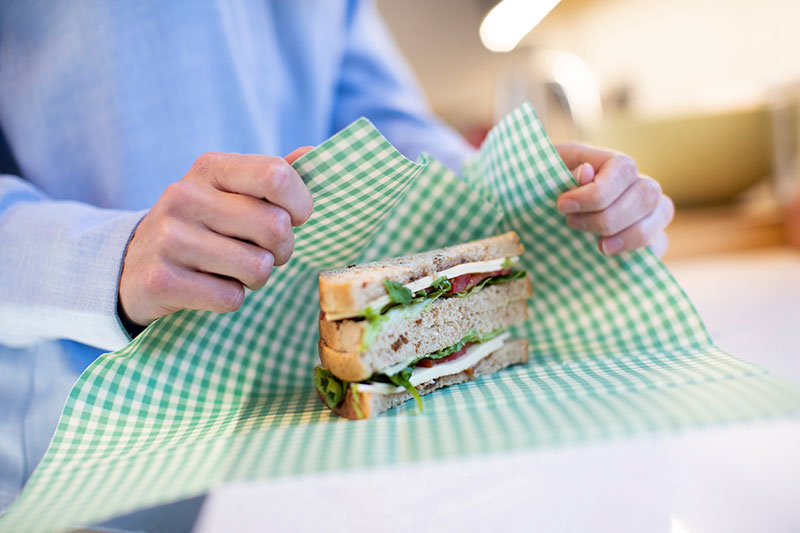
One of the most effective ways to reduce plastic waste is to replace single-use plastics with reusable alternatives and everyday items. By making simple swaps in our daily lives, we can significantly cut down on the amount of plastic waste we generate. The following are just a small collection of items that have alternatives to help get you started!
Reusable Shopping Bags
Invest in durable, reusable shopping bags to replace single-use plastic bags. Keep them in your car, handbag, or near the front door to ensure you always have them on hand when you go shopping.
Water Bottles and Coffee Cups
Switch to reusable water bottles and coffee cups to reduce the number of disposable plastic bottles and cups that end up in the environment. Many cafes now offer discounts for customers who bring their own cups, so you can save money while helping the planet.
Food Storage Containers and Wraps
Replace plastic food storage containers, cling film, and disposable sandwich bags with reusable alternatives. Consider using:
- Glass or stainless-steel containers for storing leftovers and packed lunches
- Beeswax wraps or silicone food covers instead of cling film for covering bowls and wrapping food items
- Reusable sandwich bags or washable cloth wraps for transporting sandwiches and snacks
Cutlery, Straws, and Other Daily-Use Items
Carry a set of reusable cutlery, a reusable straw, and a cloth napkin in your bag to reduce your reliance on single-use plastic items when eating out. Additionally, consider using a reusable produce bag for fruits and vegetables when grocery shopping.
By making these simple swaps in your daily life, you can significantly reduce your plastic waste and contribute to a more sustainable future.
Shopping at Zero-Waste Stores and Making Sustainable Product Choices
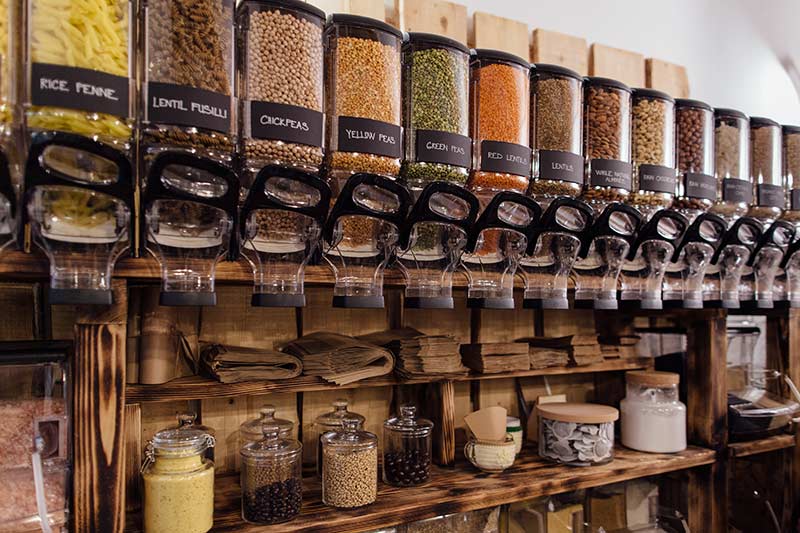
Embracing a zero-waste lifestyle can greatly reduce your plastic consumption and waste production. By shopping at zero-waste stores and making sustainable product choices, you can minimise your environmental impact and support businesses with eco-friendly practices.
Zero-Waste Shops and Refill Stations
Zero-waste shops and refill stations offer a variety of products, from food items to household cleaning supplies, with little to no packaging. These stores often encourage customers to bring their own reusable containers to fill with their desired products, or provide glass bottle to purchase as alternatives to plastic bottles. By shopping at these establishments, you can reduce the amount of plastic packaging waste you generate.
Select Products with Minimal Packaging
When shopping for groceries or household items, look for products with minimal or no plastic packaging. Choose loose fruits and vegetables instead of pre-packaged options, and consider buying items like rice, pasta, and cereals in bulk to reduce packaging waste.
Avoid Single-Use Plastic Items
Whenever possible, avoid purchasing single-use plastic items, such as disposable cutlery, plates, and cups. Instead, opt for reusable or biodegradable alternatives made from materials like bamboo, stainless steel, or glass.
Choose Eco-Friendly Personal Care and Household Products
Many personal care and household products, such as toothbrushes, cleaning supplies, and makeup items, contain plastic or come in plastic packaging. Look for eco-friendly alternatives that use biodegradable materials or come in recyclable packaging. Some options include:
- Bamboo toothbrushes and reusable cotton pads for personal care
- Solid shampoo and soap bars to replace plastic bottles
- Refillable cleaning products or DIY cleaning solutions made from natural ingredients
By making conscious choices and shopping at zero-waste stores, you can significantly reduce your plastic consumption and support a more sustainable future.
Properly Recycling and Disposing of Plastic Waste
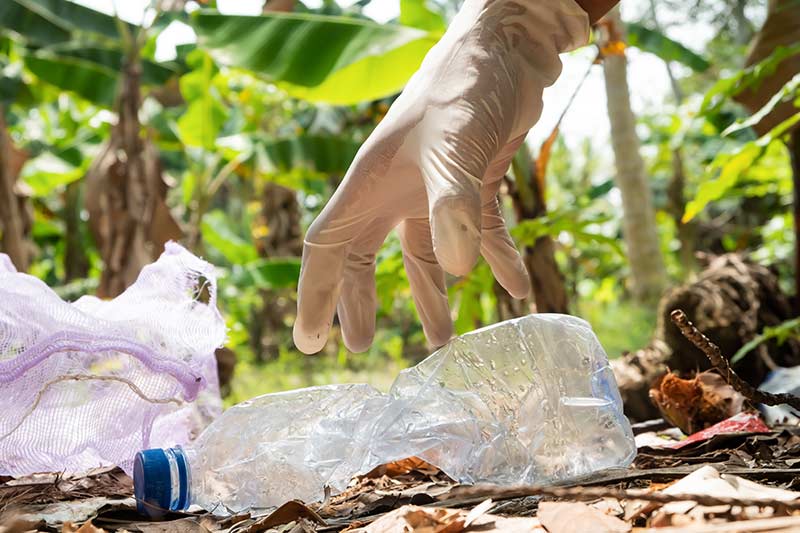
While reducing our plastic consumption is crucial, it's equally important to ensure that we properly recycle and dispose of any plastic waste we do generate. By following local recycling guidelines and disposing of waste responsibly, we can help minimise the environmental impact of plastic waste.
Learn Your Local Recycling Guidelines
Familiarise yourself with the recycling guidelines in your area to ensure you're correctly sorting and disposing of your plastic waste. Different councils may have varying rules on what types of plastics they accept and how they should be prepared for recycling. If you're unsure, consult your local council's website or contact them directly for guidance.
Special Recycling Programmes
Some types of plastic waste, such as plastic film or hard-to-recycle packaging, may require special recycling programmes or drop-off locations. Research the options available in your area and see if you can recycle these items properly, rather than disposing of them in your general waste bin.
Participate in Community Clean-Up Events
Get involved in local community clean-up events, such as beach or park clean-ups, to help remove plastic waste from the environment. Not only does this contribute to a cleaner community, but it also raises awareness when people see volunteers in action locally about the plastic pollution problem and encourages others to also take action.
Dispose of Non-Recyclable Plastics Responsibly
In some cases, you may encounter plastic items that cannot be recycled. When this happens, dispose of them in your general waste bin to prevent them from contaminating the recycling stream. While it's not ideal, it's essential to ensure that non-recyclable plastics are handled responsibly.
By properly recycling and disposing of plastic waste, we can help to reduce the amount of plastic that ends up in landfills and oceans, minimising the negative impact on the environment.
Embracing Sustainable Choices for a Cleaner Environment
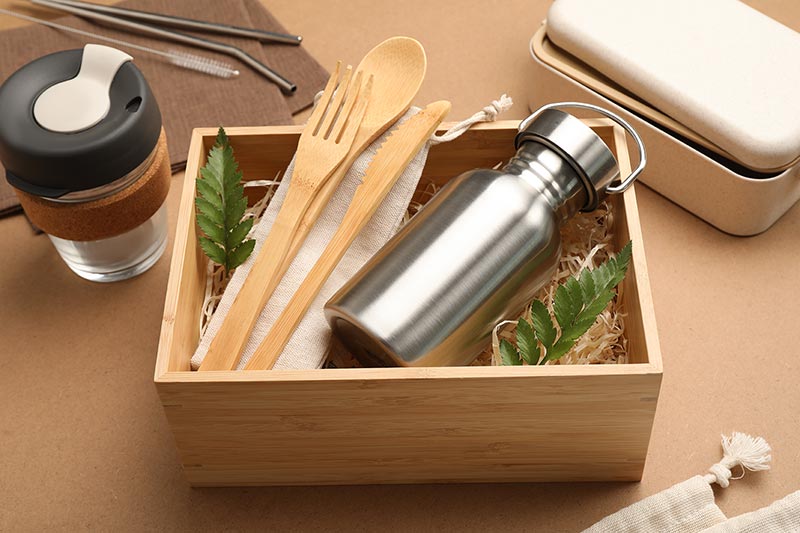
Reducing plastic waste and tackling plastic pollution is a shared responsibility that involves individuals, businesses, and governments. As a rubbish removal company, we're committed to promoting sustainable practices and contributing to a cleaner environment for everyone. Here are some practical tips on how you can join us in our mission:
Encourage Sustainable Practices in Your Community
Supporting local businesses that adopt eco-friendly practices is a fantastic way to promote sustainability within your community. You can also help other businesses make positive changes by offering constructive feedback and suggesting sustainable alternatives. When businesses see a growing demand for eco-friendly practices, they're more likely to make necessary adjustments.
Stay Informed and Keep Learning
Keep up-to-date with the latest information on plastic pollution and sustainability by following relevant news sources, blogs, and social media accounts. As new insights and innovations emerge, adapt your habits, and make improvements wherever possible.
Lead by Example
By adopting a sustainable lifestyle and actively reducing your plastic consumption, you can encourage others to do the same. Share your journey, tips, and experiences with friends, family, and colleagues to create a positive impact on the environment.
Acknowledge Your Efforts
It's essential to recognise your progress and achievements in reducing plastic waste, no matter how small they may seem. Every step you take towards a more sustainable lifestyle contributes to a healthier planet for future generations.
We hope we have given you ideas to help reduce your plastic consumption and waste, and with 95% of our waste diverted from landfill, together we can combat plastic pollution and help create a cleaner environment and future for all.

